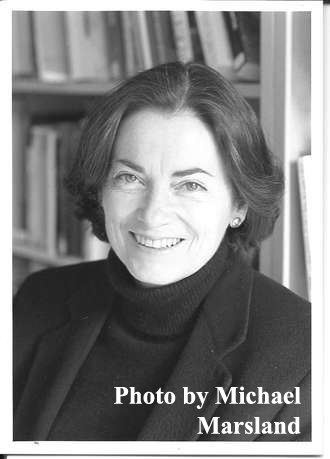One Art
BY PROF. VAROL AKMAN
Dolores Hayden
Let's take a minute to look back to 1973, my first year as an assistant professor at MIT. I planned an event on gender and space, only to find the posters covered with graffiti, "Keep them pregnant, barefoot, and in the kitchen."
"What now matters most is that we rich people give up some of our luxuries, ceasing to overheat the Earth's atmosphere, and taking care of this planet in other ways, so that it continues to support intelligent life." These words of Derek Parfit, arguably the greatest living ethicist, find an echo in Dolores Hayden's work. As an architect, Hayden provides a fresh vocabulary for talking about the spirit and design of American cities and suburbs, and suggests ways to move to more sustainable landscapes. As a poet, she writes verse that reveals her profound concern with the lives of working people, especially women, and their living quarters.
Hayden grew up in a six-story apartment building in New Rochelle, New York. Her father was a lawyer and her mother a social worker. An alumna of Mount Holyoke College, Cambridge University and Harvard University, Hayden is currently a professor of architecture, urbanism and American studies at Yale University. Before Yale, she taught at MIT, UC Berkeley and UCLA.
Her most recent non-fiction books -- featured in The New York Times, The Wall Street Journal, The Boston Globe and on CNN -- include "A Field Guide to Sprawl" (with aerial photographs by Jim Wark, 2004) and "Building Suburbia: Green Fields and Urban Growth, 1820-2000" (2003). In Hayden's words, sprawl is "excessive growth expressed as careless use of land and energy as well as abandonment of older built areas in favor of constant green field construction." She notes that sprawl produces landscapes more appropriate for cars than people, characterized by extensive highways, giant shopping malls and little communal space. A quiz on sprawl was used to pique readers' interest and promote the book: following is an excerpt. (The rest of the quiz may be found on Hayden's website, www.DoloresHayden.com.)
CAN YOU PASS THE SPRAWL TEST?
1. An alligator is:
A. a housemate who snaps at you
B. a green appliqué on your date's pink polo shirt
C. a real estate investment producing no income
2. You talk to your friends about TOADS:
A. the ugliest buildings you have ever seen
B. because it is springtime
C. temporary, abandoned, obsolete, or derelict structures
3. How many waste tires sit on tire mountains and tire dumps in the U.S.?
A. 1,000,000
B. 100,000,000
C. 500,000,000
4. Litter-on-a-stick refers to:
A. throwing away a popsicle
B. failing to recycle newspapers
C. outdoor advertising, especially billboards
5. Ball-pork has been defined as:
A. hot dogs at the Yankees' game
B. too many pigs crowded into a pen
C. a new stadium provided at taxpayers' expense for a privately-owned ball team
Hayden's previous books include "Seven American Utopias: The Architecture of Communitarian Socialism, 1790-1975" (1976), "The Grand Domestic Revolution: A History of Feminist Designs for American Homes, Neighborhoods, and Cities" (1981), "Redesigning the American Dream: Gender, Housing, and Family Life" (1984) and "The Power of Place: Urban Landscapes as Public History" (1995). As founder and president of The Power of Place, a nonprofit corporation dedicated to Los Angeles's multicultural past, Hayden laid out a downtown itinerary to celebrate the historic landscape of the city and its racial diversity.
Hayden's poetry collections comprise "Nymph, Dun, and Spinner" (2010) and "American Yard" (2004). Her poems have appeared in The Yale Review, The Kenyon Review, Michigan Quarterly Review, Raritan and "The Best American Poetry 2009." Hayden has won the Poetry Society of America's The Writer Magazine/Emily Dickinson Award and the Boyle Farber Award from the New England Poetry Club.
Among her many other prizes are an American Library Association Notable Book Award, two awards for Excellence in Design Research from the National Endowment for the Arts, the Radcliffe Graduate Medal for outstanding scholarship, the Davidoff Award for an outstanding book in urban planning and the Donald Award for feminist scholarship. She has been a Guggenheim, Rockefeller, Ford, Radcliffe and CASBS (Stanford) fellow.
This week's poem is from "American Yard," which, in the words of Katha Pollitt, "infuses formalism with spiky wit and colloquial charm." Gee's Bend is a small rural community southwest of Selma, Alabama. The town's women developed a stylish quilting technique based on conventional (African) American quilts. Martin Luther King Jr. visited Gee's Bend on the eve of the Selma to Montgomery march in 1965.
NOTES
The opening quote is from Hayden's 2006 acceptance speech for the McCoy Award of the Association of Collegiate Schools of Planning. The Parfit quote is from his 2011 book "On What Matters." I am indebted to Professor Hayden and WordTech Communications for permission to reprint the poem. As for the answers to the sprawl quiz, all are "C."
Widow Sewing Work Clothes Quilts,
Gee's Bend, Alabama
She cuts his shirts and jeans and overalls,
piecing the quilts to keep six children warm
as early winter needles through log walls.
Late fall, frost rims the creek. The weather stalls.
Her husband's dead -- took chill after a storm.
She grasps his shirts and jeans and overalls,
unstitches pockets, rips his 40 talls
with knees knocked-out from plowing round the farm.
As early winter needles through log walls,
she saves the chest and shoulders, strips all
sound cloth from thigh and seat, takes out an arm.
She clasps his shirts and jeans and overalls --
beneath the pockets, some fresh denim falls
inside a faded field. She's strapped, needs swarm.
As early winter needles through log walls,
old sun-struck cloth wraps babies like fine shawls,
embraces them with shapes a man's limbs form.
She holds his shirts and jeans and overalls
as early winter needles through log walls.